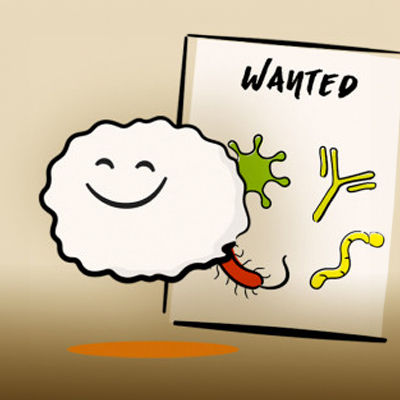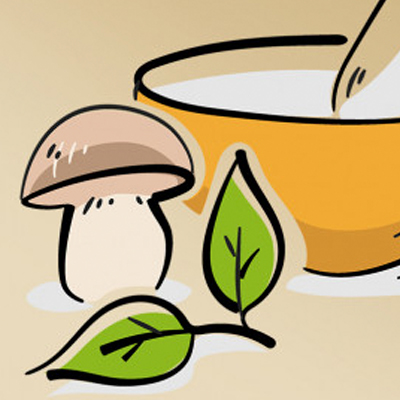Secondary Messengers
All information about "Secondary Messengers" and the related magazine articles can be found here.
Our articles are written clearly and link to scientific studies where relevant. This is how we meet our own standards: we regularly deliver new, high-quality content for you—free of charge, no sign-up required, with the highest possible benefit to you.

What are B vitamins - and what does the body need them for?
B vitamins are needed by the body to maintain vital functions. You can find out exactly what tasks they perform and how to recognise a deficiency here.

Ashwagandha Power Smoothie
For an energising start to the day. Just put all the ingredients in the blender and drink!

He who researches, finds
How can the SARS-CoV-2 virus be stopped? A team from the Charité Berlin and the University of Bonn has found a possible answer to this question in the field of nutritional supplements.

Fruity Red Currant Smoothie
Get a delicious summer beauty boost with our Red Currant Smoothie. Just put all the ingredients in the blender and drink!

It's never too early to learn!
Many people suffer from spring fever in the spring. Or is it just superstition? Find out what the phenomenon is all about.

How do phagocytes help us?
Bacteria, viruses and other pathogens are on the menu for these immune guardians. Here we explain exactly what they do.

What are medicinal mushrooms?
If you want to find out how to get the best out of medicinal mushrooms with alcohol, you've come to the right place. We don't have any recipes for white wine sauce, but we do have the most important information about these natural remedies.

What causes morning sickness?
As if being pregnant wasn't stressful enough, many women experience morning sickness. Here we explain why it happens and what you can do about it.

Who we are

vitaworld in new splendour
Messenger substances: our body's own communication experts
Imagine entering a huge house with billions of rooms. Employees sit in each of these rooms, constantly communicating with each other to keep the entire building running. This is exactly how you can imagine your body, with the rooms representing the cells and the employees representing the various organs and tissues.
But how exactly does this communication work? This is where the messenger substances come into play – our body's own communication experts.
What are messenger substances?
Messenger substances, also known as chemical messengers, are molecules that transmit information between cells. They are used by living beings for signal transmission or chemical communication (chemocommunication). Messenger substances are fundamentally important for the interaction and communication between cells and tissues within an organism. They are, so to speak, the language with which our body communicates internally. Neurotransmitters, for example, are special messenger substances that play a central role in the nervous system, especially in the brain.
How do messenger substances differ from hormones?
Hormones are a special type of messenger substance that are produced by endocrine glands and released directly into the blood to exert their effect on distant target organs. The main difference lies in their range of action:
- Hormones act systemically throughout the body, while other messenger substances often have a local effect.
- While all hormones are messenger substances, the opposite is not true. There are many messenger substances that are not hormones, such as neurotransmitters in the brain.
- Hormones are released into the blood and can thus act throughout the body, while other messenger substances, such as neurotransmitters, are often only active in limited areas, such as at synapses between nerve cells.
What are the best-known neurotransmitters?
Neurotransmitters are special messenger substances that play a central role in the nervous system, particularly in the brain. They transmit signals between nerve cells and thus control our thoughts, feelings and actions. The best-known neurotransmitters include serotonin, often referred to as the “happy hormone” because it has a strong influence on our mood and well-being. Healthy serotonin levels are crucial for preventing depression and anxiety [1].
Another essential neurotransmitter is dopamine, which is responsible for motivation and reward; a deficiency or imbalance can lead to problems such as listlessness or addictions. Acetylcholine, on the other hand, is important for muscle contraction and cognitive function, especially memory, while GABA, as an inhibitory neurotransmitter, has a calming effect and helps us to cope with stressful situations. The balance of these neurotransmitters is crucial for our mental and physical health and they illustrate how complex our internal communication via chemical agents is organized.
How many messenger substances are there?
It is difficult to say exactly how many messenger substances there are, as research is constantly discovering new ones. In the brain alone, we now know of more than 100 different neurotransmitters. In addition, there are numerous hormones and other signaling molecules in the body. These range from simple amino acids to complex peptides. This diversity enables the human body to react precisely.
From production to effect: the path of a messenger substance
The path of a messenger substance involves several important steps, from its production to its effect in the target cells:
- Production: Messenger substances are produced in special cells.
- Storage: Many messenger substances are stored in vesicles (small bubbles).
- Release: A signal triggers the release of the messenger substance.
- Transport: The messenger substance moves to its target cell.
- Binding: At the target cell, the messenger substance docks onto specific receptors.
- Effect: The target cell reacts to the signal.
- Degradation or reuptake: The messenger substance is degraded or transported back to the cell of origin.
This complex process takes place millions of times in our bodies and enables us to react to our environment, to feel emotions and to adapt our behavior.
What are the tasks of messenger substances in the human body?
Messenger substances control almost every aspect of our lives:
- Metabolism: Hormones such as insulin regulate our energy balance and help control blood sugar levels.
- Emotions: Neurotransmitters such as serotonin influence our mood and play an important role in the development of depression.
- Pain sensation: Endorphins, our body's own painkillers, are released when we feel pain and can lead to a feeling of euphoria.
- Sexuality: Hormones such as testosterone and estrogen control our sexual development and behavior. They influence not only physical characteristics but also libido and fertility.
- Learning and memory: Acetylcholine plays an important role in cognitive processes and is crucial for the formation of new memories.
- Sleep-wake cycle: Melatonin regulates our sleep cycle and is influenced by light.
Messenger substances in nature: from honeybees to insects
Humans are not the only ones to use chemical signals for communication: honeybees, for example, communicate via pheromones to coordinate the swarm. These chemical signals help them find food sources and signal danger.
In many insects, chemical signals play a role in finding a mate. Some butterfly species can detect the pheromones of potential mates over a distance of several kilometers.
Plants also release messenger substances to defend themselves against pathogens. They can even warn neighboring plants when pests attack.
How messenger substances affect our health
It is now clear that messenger substances are important for our health. It is therefore only logical that an imbalance of messenger substances can lead to various illnesses [2]:
- Depression is often associated with a serotonin deficiency. This leads to therapeutic approaches that aim to increase serotonin levels in the brain.
- In Parkinson's disease, dopamine-producing cells die, leading to the characteristic movement disorders.
- Diabetes occurs when the body does not respond properly to the hormone insulin or does not produce enough of it.
- Thyroid disorders are often due to an over- or underproduction of thyroid hormones.
What influence do drugs have on the messenger substances in our body?
Drugs have an extreme effect on our neurochemical processes and influence the finely tuned balance of our neurotransmitters. One example is cocaine, which blocks the reuptake of dopamine. This leads to an intense feeling of happiness, but in the long term it can lead to the exhaustion of the dopamine system.
Opiates work by binding to the same receptors as our body's own endorphins. This binding explains not only their pain-relieving effect but also their high addictive potential. Regular use can cause the body to become accustomed to the drug, requiring ever-higher doses.
Alcohol, on the other hand, has a complex effect because it influences various neurotransmitter systems. For example, it enhances the effect of GABA, which leads to its calming effect. At the same time, it inhibits the activity of glutamate, which increases the dampening effect on the central nervous system.
How are genes and messenger substances related?
Neurotransmitters such as dopamine play a crucial role in signal transmission in the nervous system and can subsequently regulate the activity of certain genes. In extreme cases, this can even influence cognitive performance such as intelligence. Particularly interesting in this context is the epigenetic regulation of genes that code for dopamine receptors.
This regulation can be triggered by various environmental influences, such as stress. Such external factors can cause epigenetic changes in genes via messenger substances and significantly influence their activity [3]. These findings not only help us to understand how our brain works, but also open up new perspectives for understanding and possibly treating neurological and psychiatric disorders in which gene regulation plays an important role.
Messenger Substances and Nutrition
Our diet plays a crucial role in influencing the production and effect of neurotransmitters, which in turn significantly determines our physical and mental well-being and influences how much energy we have. Tryptophan, an essential amino acid and precursor of serotonin, is found in protein-rich foods such as chicken, turkey and nuts. This compound is important because it supports the body's production of the “happy hormone” serotonin, which is crucial for our mood and emotional balance. Omega-3 fatty acids, found primarily in fatty fish such as salmon and mackerel, also promote the function of neurotransmitters and can potentially help prevent depression by supporting brain health.
Equally important is vitamin B6, which is found in foods such as whole grains, bananas and potatoes, as it supports the production of numerous messenger substances and thus strengthens the nervous system. A balanced and nutritious diet thus ensures that the synthesis and effect of messenger substances is optimal, which directly contributes to a better sense of well-being and an overall healthier lifestyle.
What does stress have to do with messenger substances?
Stress activates various messenger substances in our body:
- Cortisol, often referred to as the stress hormone, is released in stressful situations and prepares the body for fight or flight.
- Adrenalin, another stress hormone, increases heart rate and blood pressure and mobilizes energy reserves.
Chronic stress is a challenge for our body, can lead to an imbalance of these messenger substances and impair our health in the long term.
Messenger substances in the course of life
From birth to death, the production and effect of many messenger substances changes:
- The production of growth hormones decreases, which leads to changes in muscle development and fat distribution.
- The levels of sex hormones such as estrogen and testosterone decrease, which triggers the menopause or andropause.
- The sensitivity of receptors can decrease, which affects the effectiveness of messenger substances.
Messenger substances hold our biological system together
Neurotransmitters are the invisible threads that hold our complex biological system together: from controlling our daily functions to our deepest emotions, they are involved in everything. Neurotransmitters are the basis of our lives, our feelings and our experiences. And every day we learn more about the important chemical messengers that make us who we are.
Research into neurotransmitters has revolutionized our understanding of the human body and is constantly opening up new possibilities in medicine and science. From the development of new drugs to insights into the emergence of consciousness, neurotransmitters play a central role in all areas.
Sources:
[1] https://pubmed.ncbi.nlm.nih.gov/31002895/
[2] https://pubmed.ncbi.nlm.nih.gov/37385351/
[3] https://pubmed.ncbi.nlm.nih.gov/19259783/

